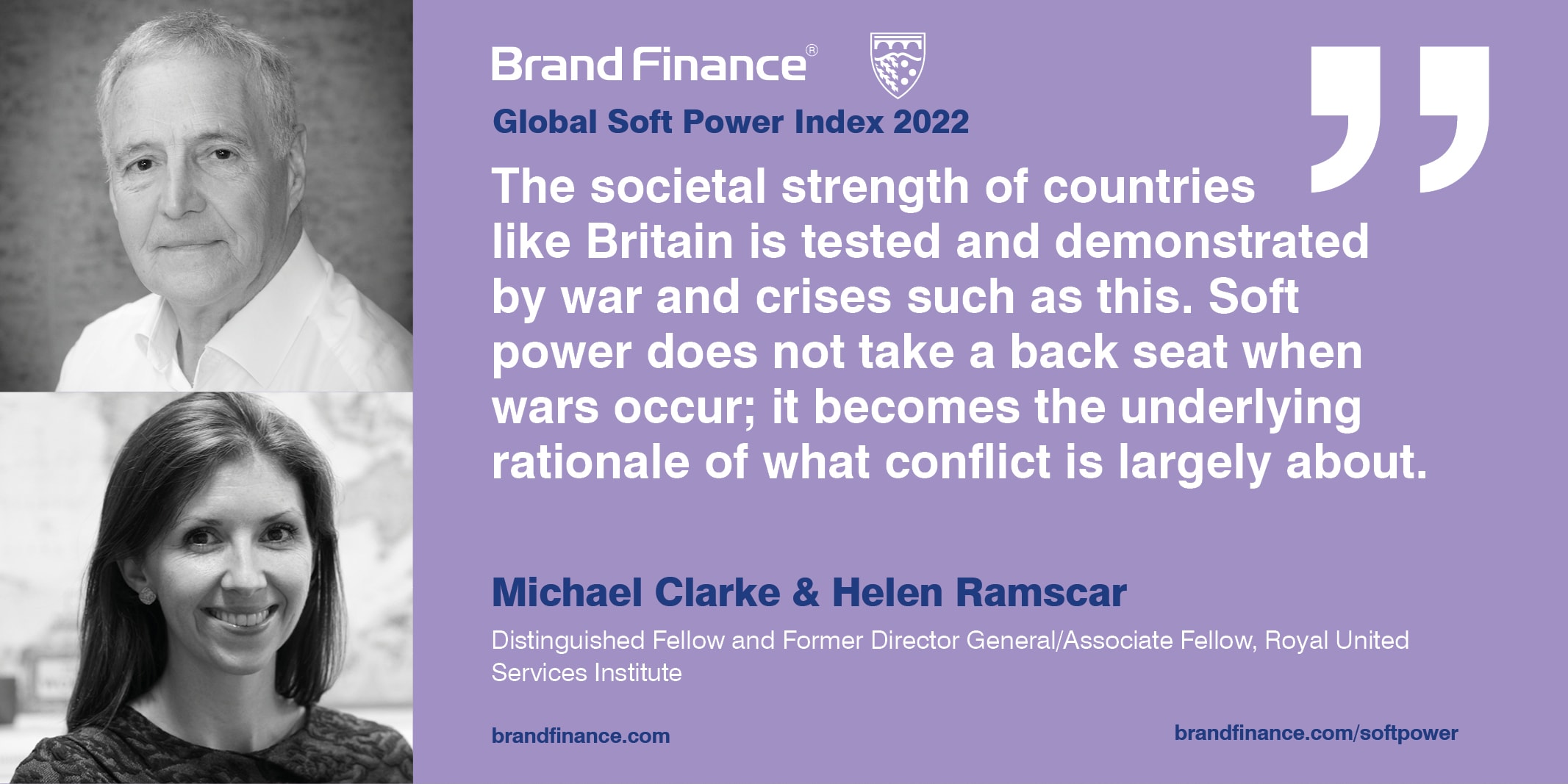This article was originally published in the Global Soft Power Index 2022.


European society is being tested as never before in 2022 with the Russian invasion of Ukraine. European countries are suddenly confronted with the first inter-state war on the continent since 1945. They are being forced to consider their fundamental values, and what they will sacrifice to defend them, since all policy to counteract Russia’s invasion of a neighbouring country will involve domestic pain and sacrifice for other Western countries.
The outcome of the immediate crisis across the battlegrounds of Ukraine will be determined in the clash of hard, military power. But the outcome of the wider crisis this war has triggered across Europe and the rest of the world will be determined by the greatest competition in soft power since the darkest days of the Cold War. Seldom has soft power been so consequential a force in global politics as it is just now. The western world and its values have been challenged in a way few thought likely at the beginning of 2022.
Our analysis of Britain’s soft power in Britain’s Persuaders: Soft Power in a Hard World was completed in 2021 where we argued that – along with the other ‘middle powers’ of Europe – Britain would find the decade of the 2020s very testing, raising in particular a number of difficult security issues – including the growing threat of an explicitly revisionist Russia. We argued that though this decade would pose quite a challenge for the British political establishment, British soft power was nevertheless a great source of deeper societal strength and that it could be utilised more effectively to Britain’s advantage in world politics if it was understood better.
Soft power, it is often acknowledged, flows more from society and its institutions than from a country’s political establishment. It is a phenomenon that exists over the long-term – structuring power relationships more than manipulating them to a particular end. Soft power is the power of social magnetism; the power that doesn’t project itself too explicitly, but which creates imitation in other countries; it is the power that makes other societies want to be more like our own.

With these principles in mind, and understanding that Britain historically scores well in most of the world’s various soft power rankings, we wanted to look more closely at what that involved in specific terms. We took a different approach to many other studies which we nevertheless adopted as our starting point. British society is rich and varied. It has deep roots and, for historical and demographic reasons, has a significant presence in world politics that goes beyond the influence of its governmental or formal political influence.
So we defined nine different ways in which ‘Britain’s persuaders’ – those people and institutions who carry influence in various ways across the world – might, consciously or not, be expressing their soft power attractions. We looked at the range of ‘convenors’ who naturally brought groups and ideas together. We analysed the officials in government who achieved influence primarily by ‘speaking softly’ in what they did. British research and innovation was another source of soft power influence, as was the influence British institutions have in setting functional regulations in so many different fields across the world. We looked at British multiculturalism and cosmopolitan values as a natural source of international influence; at education in all its formal and informal guises; and at the reputation Britain possesses for nurturing and attracting creativity in many different fields. We tried to assess the impact and direction of British entertainment industries, ranging across all sectors from theatre and film to music and sport. Not least, we assessed the power of ‘British individualism’ – even eccentricity – in trying to understand how Britain projects itself as an easy-going home for bloggers, vloggers, stars, saints, and the socially anarchic.
We set this analysis in the existential terms of power – the understanding of ‘power’ as one of the fundamental dynamics of human and societal behaviour. And at the end of our analysis we suggested how a better understanding of British soft power could more fruitfully be injected into government thinking, and particularly into Whitehall’s recent attempts to handle policy in more integrated and holistic ways.
When we had completed the manuscript for Britain’s Persuaders we had little idea quite how relevant its underlying concerns would be. ‘Power’ exists on a spectrum where both hard and soft expressions of it are ever-present. Paradoxically, it is in times of war itself that the necessary fusion of both hard and soft power thinking is most evident, and certainly most required. The war in Ukraine has crashed onto the international scene as the most explicit challenge of a growing authoritarianism in the twenty-first century to the liberal democracies, which have been on the back-foot politically and economically for more than a decade. If the liberal democracies have now rallied as a result of this challenge – and accepted some significant degrees of national sacrifice to stand up against an unprovoked military attack – the strength and depth of their societal values, their determination to act in accord with them, and the influence of western society across the world, is at issue with every passing day.
The societal strength of countries like Britain is tested and demonstrated by war and crises such as this. Soft power does not take a back seat when wars occur; it becomes the underlying rationale of what conflict is largely about.

